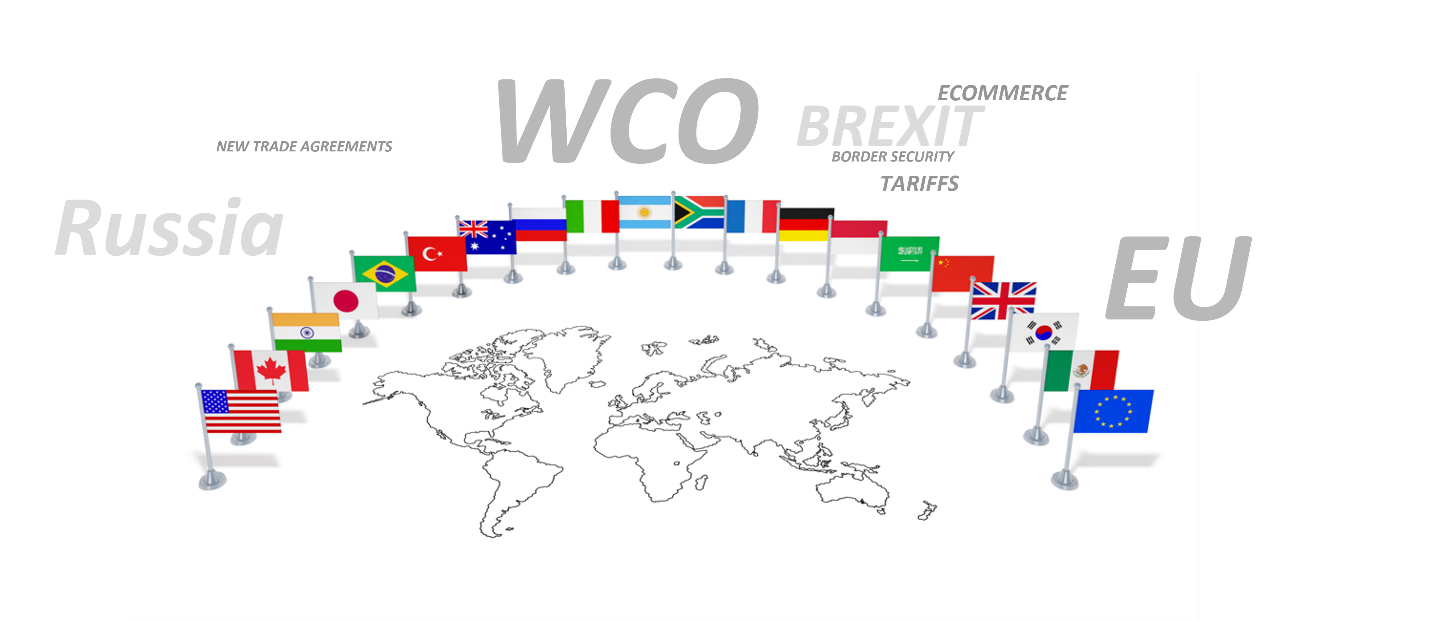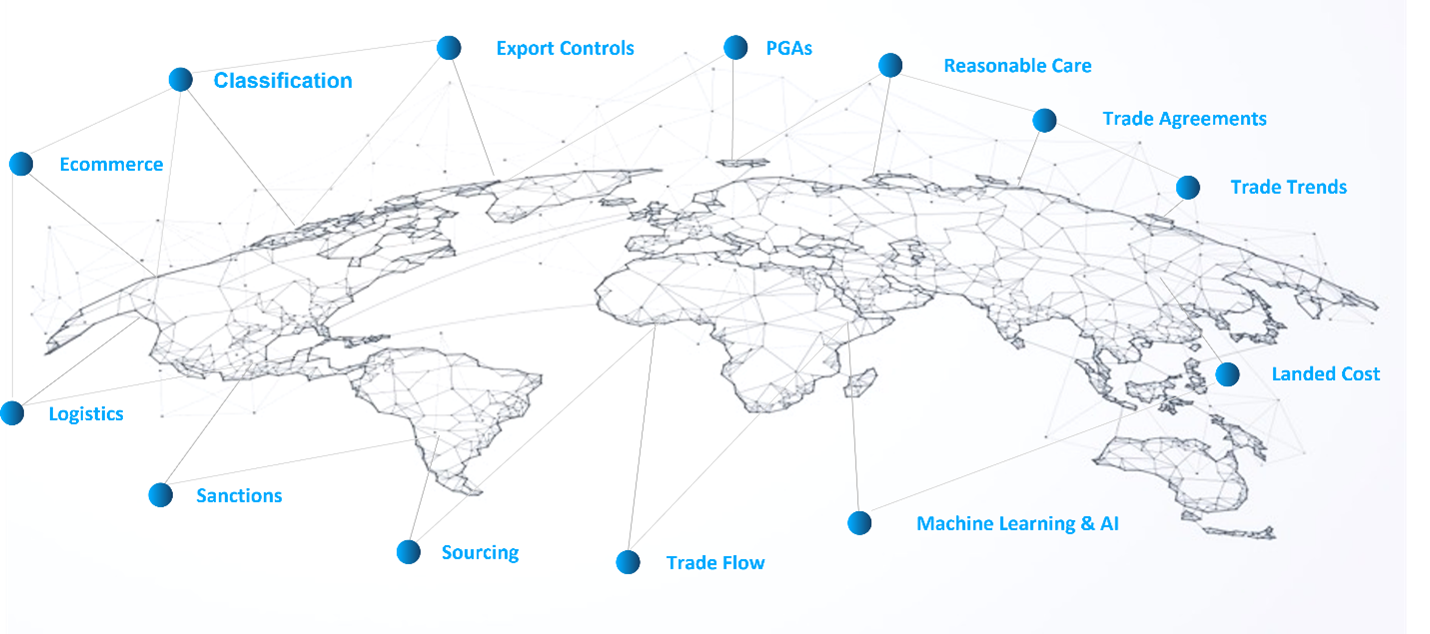By Jackson Wood, Director, Industry Solutions, Trade Compliance, Descartes Systems Group

The field of global trade regulations is vast and constantly evolving, with regulations varying across countries and regions. Compliance with these regulations involves understanding trade policies, tariffs, customs procedures, documentation requirements, and other factors. Furthermore, regulations can change frequently due to geopolitical events, trade agreements, or updates by regulatory authorities.

Figure 1: Continuous and changing complexities in global trade
Global Trade Management (GTM) software solutions can be an essential part of an organization’s overall approach to trade compliance. They serve to automate and streamline key elements of the international trading process, thereby reducing the risk of non-compliance. However, GTM software is often separate from global trade content. Why is this? Read on to learn more.
How Global Trade Content Differs from GTM Software
Global trade content and global trade management software are often treated as separate entities due to their distinct functions and purposes within the realm of international trade. Here’s an explanation of their differences:
Global Trade Content: Global trade content refers to the data and information related to international trade regulations, documentation requirements, tariffs, duties, trade agreements, and other trade-related data elements. It encompasses a vast amount of information sourced from various governmental bodies, regulatory agencies, customs authorities, and trade organizations worldwide. This content provides businesses with accurate and up-to-date trade-related information, including product classifications, trade restrictions, compliance requirements, and preferential trade agreements.
Global Trade Management (GTM) Software: GTM software, on the other hand, refers to a set of software solutions designed to streamline and automate the end-to-end processes associated with global trade operations. It encompasses functionalities such as import/export compliance management, trade documentation management, customs clearance, duty calculation, trade finance, supply chain visibility, and trade analytics. GTM software helps businesses manage and optimize their international trade activities, ensuring compliance with trade regulations, minimizing costs, and enhancing operational efficiency.
While global trade content provides the necessary regulatory and trade-related data, GTM software utilizes this content to facilitate and manage actual trade operations. The content serves as the foundation for the software’s functionality, enabling it to automate processes, generate accurate trade documentation, calculate duties and tariffs, screen for compliance, and provide insights into trade operations.
By separating global trade content from GTM software, businesses can ensure that they have access to reliable and comprehensive trade-related information while being able to choose and integrate the appropriate software solution that aligns with their specific trade management requirements. This separation allows for flexibility in selecting GTM software that can be customized and integrated with other enterprise systems to create a holistic global trade management solution.
Understanding the Different Skills Required for GTM and Global Trade Content
GTM providers like SAP, Oracle and others are software companies which primarily focus on developing and providing enterprise-level software solutions to businesses. While these companies offer their GTM solutions as part of their product portfolios, the content related to global trade regulations and compliance requirements is vast and continuously evolving.
Creating and maintaining content for global trade regulations is a complex and resource-intensive task. Regulations vary across countries and regions, and they frequently undergo changes and updates. Compliance with these regulations involves understanding trade policies, tariffs, customs procedures, and documentation requirements, among other factors.

Figure 2: Global Trade Content encompasses a broad array of trade information from various data points in the supply chain
To address the diverse needs of their global customer bases, GTM providers collaborate with external content providers that specialize in trade compliance, such as Thomson Reuters, E2Open, Descartes, and other industry leaders. These providers have the expertise and dedicated resources to monitor, interpret, and update the content related to trade regulations and compliance requirements. By partnering with such content providers, GTM software providers can deliver accurate and up-to-date information to its users.
This focus on collaboration allows GTM providers to leverage the expertise of industry leaders while concentrating their own efforts on developing and enhancing their software solutions. This approach helps GTM providers deliver comprehensive and reliable trade compliance functionality to their customers, without the need to independently create and maintain vast amounts of content.
What Capabilities Must a Global Trade Content Provider Have?
Creating global trade content for GTM software requires a combination of domain expertise, regulatory knowledge, and technical proficiency. Here are some key areas of expertise that are typically required:
Trade Compliance: In-depth understanding of global trade regulations, including import/export controls, customs requirements, sanctions, embargoes, trade agreements, preferential trade programs, and other relevant trade policies. This expertise involves keeping up-to-date with regulatory changes and understanding their implications on cross-border trade.
Legal and Regulatory Knowledge: Familiarity with legal frameworks and regulatory bodies governing international trade, such as World Trade Organization (WTO) rules, regional trade bloc regulations (e.g., European Union regulations), and local customs laws. Knowledge of specific country requirements and trade documentation is also crucial.
Industry-Specific Knowledge: Awareness of industry-specific trade compliance challenges and requirements. Different industries may have unique regulations, certifications, or licensing requirements. For example, the pharmaceutical or automotive industries may have specific regulations related to product safety, labeling, or licensing.
Data Management and Integration: Proficiency in handling and integrating large volumes of trade-related data, such as tariff codes, customs classifications, duty rates, and product descriptions. Knowledge of data formats, standards (e.g., Harmonized System Codes), and data mapping is essential.
Technology: Familiarity with the architecture, configuration, and integration capabilities of GTM systems is essential. Knowledge of functionalities related to trade compliance screening, document management, import/export management, and reporting is necessary to ensure seamless integration and utilization of the content.
Content Creation and Maintenance: Skills in content creation, curation, and maintenance processes. This involves researching, interpreting, and summarizing complex trade regulations into understandable and actionable content. It also includes continuously monitoring regulatory updates, analyzing their impact, and updating the content accordingly.
Collaboration and Communication: Effective collaboration with internal stakeholders, external content providers, trade experts, and regulatory bodies is crucial. Strong communication skills are necessary to understand customer requirements, gather feedback, and align content development with the evolving needs of GTM users.
These areas of expertise work in synergy to ensure that the global trade content provided for GTM software is accurate, comprehensive, and compliant with the latest trade regulations, thereby helping businesses navigate complex international trade environments successfully.
The Business Benefits of Working with Global Trade Content Providers
To ensure the accuracy and reliability of the trade content provided inside of GTM software solutions, it is often more practical for the GTM software vendor to partner with external content providers who specialize in trade compliance. These providers have dedicated resources and expertise in monitoring, interpreting, and updating the vast amount of trade-related content.
Partnering with external content providers offers several benefits:
Expertise: Trade compliance content providers possess deep domain knowledge and expertise in global trade regulations. They have dedicated teams that closely monitor regulatory changes and have established relationships with regulatory authorities.
Timeliness: External content providers can quickly update and provide real-time information about regulatory changes, ensuring that GTM users have access to the most current trade content. This is particularly important as regulatory updates often have immediate implications for businesses.
Comprehensive Coverage: Trade content providers offer comprehensive coverage of global trade regulations, considering diverse countries, regions, and industries. They ensure that the content encompasses a wide range of regulatory requirements, thereby meeting the needs of GTM users operating in various markets.
Scalability: External content providers are equipped to handle the scale and complexity of global trade content. They have the infrastructure and resources to process and manage large volumes of data, including tariff codes, customs rules, and trade documentation requirements.
By partnering with external content providers, software companies can leverage their expertise and focus their efforts on developing and enhancing the core functionalities of GTM platforms. This collaboration ensures that GTM systems remain a robust and effective solution for businesses navigating the complexities of global trade compliance.
Partner with Descartes for Accurate Global Trade Content
With timely, accurate, and high-quality global trade content, you can more effectively minimize regulatory compliance risks, increase supply chain velocity, reduce cost, and boost operational efficiency through your Global Trade Management system.
Descartes is an industry leader in trade intelligence, and a strategic enabler for global trade compliance companies. We help ensure that customers have access to the most accurate and up-to-date global trade management content. The information is engineered in a way that produces output customers can rely on to add value to their business.
Our solutions can add value to a wide range of Enterprise Resource Planning (ERP) systems including SAP and Oracle, as well as cover integrated denied party screening including customized content such as sanctioned ownership screening, adverse media coverage and PEPs.
Request a demo by contacting our global trade content specialist today.
